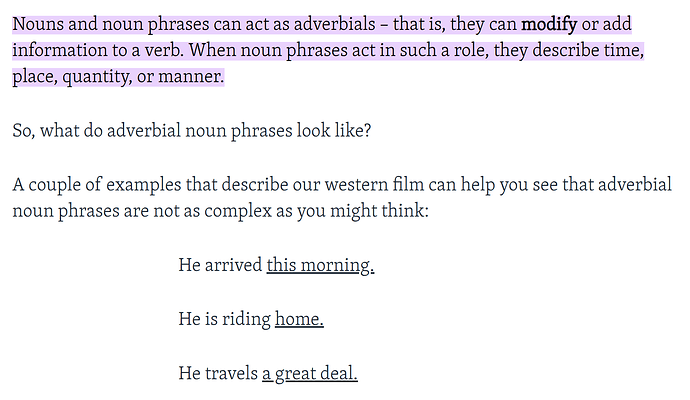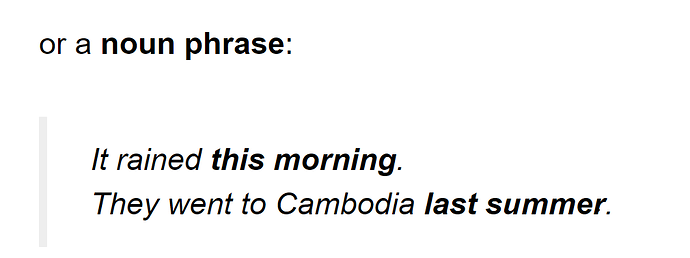Of all my CF articles so far, I put the most work into this one. I edited it more. I also did some rewriting and cut out over 1500 words. I also reread some past things I wrote about Yes or No Philosophy. I think it’s a more difficult topic to explain, partly because there’s a lot of different but related ideas that I could talk about. I tried to make it understandable and to figure out which ideas were important to include or not.
Related topic:
Practice grammar trees using this paragraph:
Karl Popper’s philosophy, Critical Rationalism (CR), rejects positive arguments (arguments in favor of ideas). It rejects trying to figure out how much support, evidence or justification an idea has. And it rejects induction, which is a type of positive argument.
Karl Popper’s philosophy, Critical Rationalism (CR), rejects positive arguments (arguments in favor of ideas).
[rejects [“Critical Rationalism (CR)” [philosophy [“Karl Popper’s”]]] [arguments [positive [(arguments [in [favor [of [ideas)]]]]]]]]
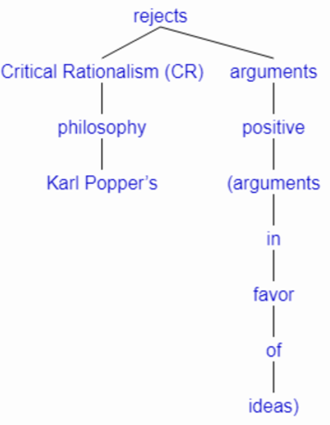
It rejects trying to figure out how much support, evidence or justification an idea has.
[rejects [It] [trying [“to figure out” [idea [an] [has [or [support] [evidence] [justification]] [much [how]]]]]]]
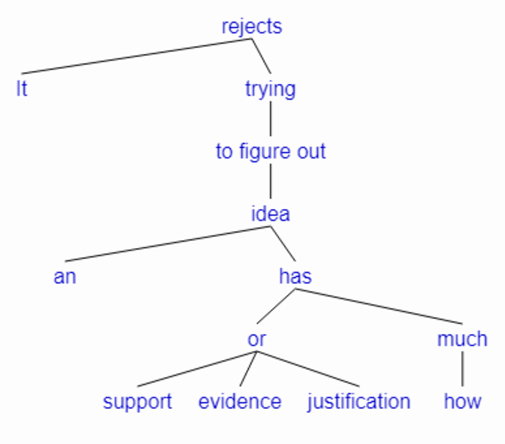
And it rejects induction, which is a type of positive argument.
[And [rejects [it] [induction [which [is [type [a] [of [argument [positive]]]]]]]]]
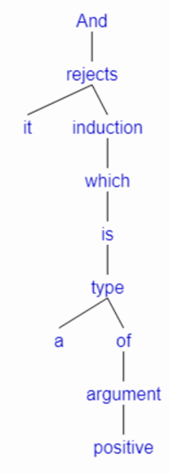
(arguments in favor of ideas)
What’s the purpose and grammatical part of speech for this phrase?
I read the parenthetical phrase as an adverb that modifies “positive”. It explains, defines, and qualifies “positive” as a sort of technical term, instead of the more common usage of positive, which means good or having value.
Within the parenthetical, “argument” is a noun that is modified by the adjectival prepositional phrase “in favor”. The phrase “in favor” is modified by the prepositional phrase “of ideas”, which is an adverb.
I think the parenthetical functions as a modifier for “argument” but it’s also, grammatically, a noun phrase (root word of subtree is a noun). It’s an appositive that restates something with more/different detail. The lead word of both the phrase being modified, and the modifier phrase, is a noun (“argument”). I’m not sure if a noun phrase even can be a modifier for something without a noun aspect.
It tells us, not what “positive” means, but what “positive argument” means, and the lead word there, the root of the subtree for that phrase, is “argument”, so the main word being modified is “argument”.
Error correction takeaways:
- Look at phrases and see what kinds of phrases the sentence has within it
- Consider the root word of the phrase and what part of speech (noun, verb, adverb, adjective) that the root word has in its definition
- Consecutive noun phrases could be a good hint that there is an appositive
I didn’t remember learning about appositives in my grammar studies up to this point. I remember something about nouns as modifiers but I don’t know if that was about appositives or another thing. Looks like the nouns as modifier thing that I already learned a bit about was stuff like this: https://learnenglish.britishcouncil.org/grammar/english-grammar-reference/noun-modifiers.
From what I have seen appositives are modifiers. I gather that appositives can stand in for the phrase that they are modifying. There are noun phrase appositives (adjective phrases), verb phrase appositives (adverbs), and adverb phrase appositives (also adverbs).
Appositive references:
https://owl.purdue.edu/owl/general_writing/grammar/appositives.html
I watched this but the content about appositives didn’t stick with me at all (14:24 of Max Tutoring #4)
Last paragraph of this message mentions appositives. Also found good info on the word “that” in this message.
https://groups.google.com/g/fallible-ideas/c/0WWWCQks3ro/m/jGWrLSO7BwAJ
Regarding:
I’m not sure if a noun phrase even can be a modifier for something without a noun aspect.
I’m not sure if “noun aspect” is a technical grammar term. I didn’t see anything on it with a few google seaches. I did find stuff about noun phrase adverbials, which look like noun phrases that modify verbs and rarely modify adjectives. I don’t remember if these have come up before in anything that I have look at but here are some references about them. They look to be mostly a collection of special cases.
Adventures with Adverbials: Part Two.
https://learnenglish.britishcouncil.org/grammar/english-grammar-reference/how-we-make-adverbials

